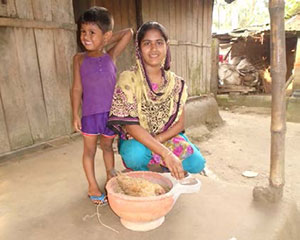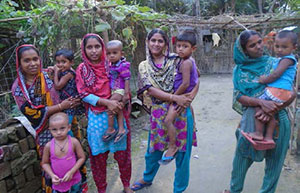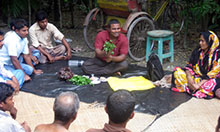Bangladeshi Mothers Learn to Share Best Practices

Photo credit: SPRING/Bangladesh
In the small village of Durgapur in Jessore Sadar upazila, graduates of the local farmer nutrition school (FNS) are on a mission—they’re determined to spread life-changing lessons about how to achieve better nutrition and hygiene at home. SPRING has been supporting Durgapur’s FNS since 2012 to improve nutrition and hygiene for pregnant and lactating women and women with children under two through improved access to a more nutritious and more diverse diet.
Farmer nutrition schools include 18 different sessions conducted over 9 months. The group of 24 women in Durgapur attended the FNS sessions with enthusiasm. Two years after completing all the sessions, their households have adopted the optimal behaviors promoted through the FNS sessions. But the FNS students are not just practicing what they learned; proper nutrition and hygiene are now a standard way of life in Durgapur and improving and safeguarding nutrition has become a matter of village pride.
The women who participated in the FNS during their pregnancy say their babies now enjoy more nutritious and diverse diets on a regular basis and rarely become ill. An important change the women have made is to increase the number of eggs their families consume. Better methods of chicken rearing—such as early separation of chicks from the broody hen—have made it easier to produce the eggs they need.
FNS households have shared these techniques with friends and neighbors; in fact, one can see improved hatching pots, or hajols, in almost every household. Improved poultry sheds are also a common sight throughout the village. Food production within the homestead frees up money that was previously needed to buy eggs, vegetables, and fish for household savings or other family needs.

Photo credit: SPRING/Bangladesh
In Durgapur, farmer nutrition schools have helped debunk longstanding nutrition myths and decrease harmful care practices that are pervasive throughout Bangladesh. “Some of us had a misconception earlier that it is important to feed water to the baby during the first six months, particularly in the summer. However, we now know exclusive breastfeeding alone is enough,” said one FNS graduate.
Some of us had a misconception earlier that it is important to feed water to the baby during the first six months, particularly in the summer. However, we now know exclusive breastfeeding alone is enough.
-FNS graduate
Women have also learned that their first milk (colostrum) is full of antibodies and vitamins, a perfect gift to their baby. Typically, it was considered spoiled and excreted or babies were given harmful pre-lactal-type feeds, such as honey. Now they know that introducing complementary foods too early (before six months) can be detrimental to their child’s growth and development.
When so many women started benefitting from the new methods taught by USAID’s SPRING project, improved nutrition and hygiene practices spread throughout the entire village. The advent of tippy taps, for instance, has created tremendous spillover in the area. Entire households, including men and children of all ages, are using this simple handwashing station, especially before eating food and after using the toilet. There is more awareness about handwashing and hygiene among villagers than ever before. Visitors to Durgapur will also notice that the women are eager to learn about, discuss, and share new ideas and information in an effort to do what is best for themselves and their children. Participating in the FNS has strengthened their bond and their voices. Durgapur’s FNS graduates have motivated the community, bringing nutrition, handwashing, and hygiene to the attention of everyone around them.
